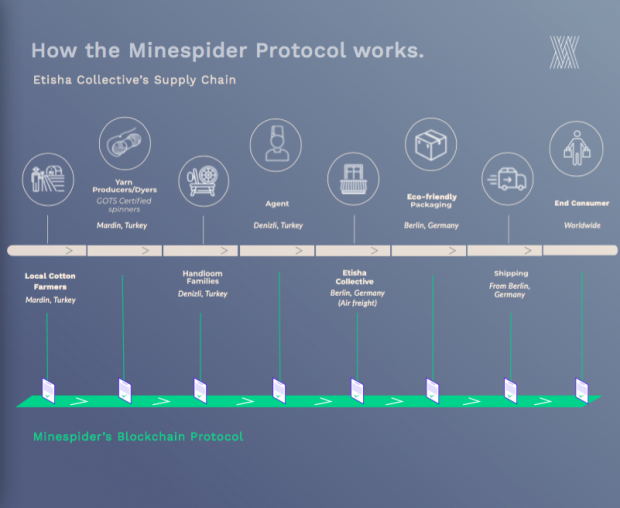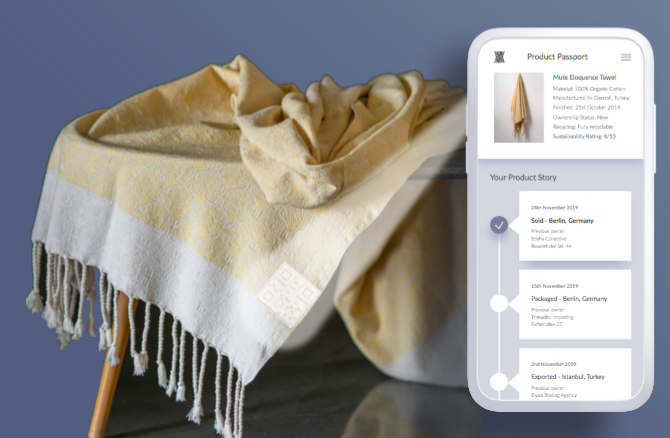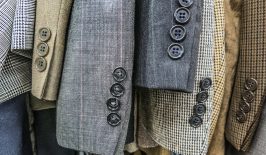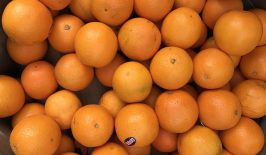The Berlin startup Threadcounts is tracking and tracing the journey of fairtrade textiles – from farm, to consumer, to recycling centre. All with the help of the blockchain and a product passport that shows just how sustainable your clothing really is.
For many years, clothing had to be one thing above all else – cheap. But while the fast fashion industry is still producing mountains of cheaply-made clothes with a short life span made under dubious production conditions, which are difficult to recycle – the market is changing. Consumers are increasingly concerned that the things they wear are high-quality, durable and fairly produced.
The Berlin startup Threadcounts wants to support this development and has set itself the goal of breaking down – and opening up – the supply chains within the textil industry. It’s a challenging task because the industry is so complex. It is often not easy to find out exactly where the raw materials for the finished textiles come from. But tracking and tracing is becoming increasingly important, and many consumers want to know whether their clothing has been produced sustainably or whether by buying it they are contributing to environmental damage and perpetuating inhumane working conditions. Threadcounts is convinced that transparent supply chains, with information disclosed at every step from source to store and beyond, will soon be indispensable. And disclosing this kind of information could also give sustainable companies a competitive advantage.
The idea of tracking textile supply chains comes from Ella Cullen, Chief Marketing Officer of Threadcounts. The New Zealander told RESET: “I actually grew up on a sheep farm, so I knew exactly where my wool pullover came from. At some point, I harkened back to my roots and thought: ‘Why shouldn’t we all know where our textiles come from?'”
Product Passport & Blockchain
To help bring transparency into the supply chains, Threadcounts is developing a so-called product passport that contains the information about each stage of the production process. The idea is for each garment to have a QR code on the label. This code can be scanned with any mobile phone to show the complete supply chain. “The customer will be able to scan the QR code on their garment and view the product passport, detailing their garment’s origin, which materials it contains, the manufacturing processes, sustainability metrics & recycling options.” Cullen explains. A Threadcounts app – currently under development – is set to make it even easier to use.
Sounds good, but how can we ensure that the supply chain doesn’t contain any incorrect information? The blockchain offers a solution. Threadcounts is the subsidiary of Minespider, a startup that is on a mission to remove “conflict minerals” (the unethically sourced minerals and metals that are often found in electronic devices like smartphones) from our supply chains. “We recognized very quickly that the textile industry has many of the same issues as mining,“ Cullen explains. Small manufacturers often find it difficult to ensure transparency because proper supply chain documentation is often too expensive. Larger companies worry about data protection, which can slow down the introduction of transparency measures. “Because Minespider’s technology is material agnostic and could be easily applied to textiles, Threadcounts was born,” Cullen says.
We talked to the founder of Minespider, Nathan Williams, in an interview on the subject back in 2018. Threadcounts uses the same technology. Ella Cullen explains: “Minespider is actually a fairly simple concept: we create digital certificates that travel with the material up the supply chain. Blockchain makes the certificates impossible to forge or duplicate and we don’t have to rely on a single central authority to control the system.“ The also solves the issue of data protection: the textile manufacturers can choose which data is public and which is kept private. In this way, it’s possible to publish key information in order to back-up sustainability claims, while also keeping private data secure at the same time. It guarantees compliance with human rights standards and guarantees sustainable production, while preventing attempts to mislead consumers with false sustainability claims.
 ©
© Sustainable Luxury Towels from Turkey
Threadcounts is already working with the first textile producers. “Currently, we are working on a project tracking certified organic cotton from farms in Turkey to a range of sustainable towels, produced by a German company,” Cullen says. Several other fashion brands have already approached Threadcounts wanting to use the product passport to showcase their sustainable sourcing efforts.
The blockchain could become an important tool for the textile industry if supply chain disclosure becomes the norm. However, the question remains as to whether the technology could and will also be used in mass production – and what the environmental impact of that would be, considering the huge energy-appetite that blockchain applications have. High-quality luxury products like to adorn themselves with sustainability certificates, but manufacturers of cheaply-produced products probably won’t be disclosing any information about their supply chains any time soon. In the end, it comes down to the consumers: If they demand reliable proof about sustainable production, then Threadcounts could certainly make an important contribution.
This is a translation by Marisa Pettit of an original article that first appeared on RESET’s German-language site.








